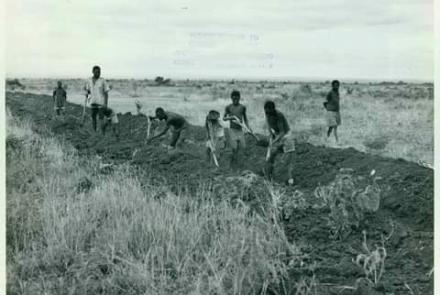Jomo Kenyatta was born Kamau Wa Muigai to parents Muigai and Wambui. They were ordinary people whose main preoccupation was farming in Gatundu village. The exact date of Kenyatta’s birth is not known for certain but is presumed to be around 1895.
Kenyatta was born some twenty-five miles north-east of Fort Smith at Ngenda, a land of sugar cane and cattle pasture where two rivers met.
After Kenyatta’s birth and his passage from infancy to childhood, Muigai and Wambui had another son, Kungu. Earlier, there had been an older boy also called Kongo who had died. The second Kongo bore the same name as Muigai’s father. Among the traditional African communities, a child learnt many skills from the father depending on what the father was thus Kenyatta spent most of his childhood herding the family’s flock, usually with other boys from neighboring families.
He also learnt a few lessons from his mother over the evening meals in the kitchen
He picked up the traditions of his people, details of his family background and the names of his ancestors, of the ways of God and His various resting places up on the mountain peaks and, most important, the legend of Gikuyu and Mumbi.
Ngenda was one of a series of ridges forming what was later to be known as the Kiambu district, part of the southern section of the forest belt through which clans were migrating throughout the nineteenth century. Any head of the family staked his claim to whatever he and his sons could clear and his wives could cultivate. The founder of Kenyatta’s family lands at Ngenda was Muigai’s father, Magana. ‘Magana’ in Kikuyu literally means ‘hundreds’; perhaps it referred to the extent of his possessions. As Magana’s family grew, the ridges filled out, the clan prospered and only 25 miles then separated them from the edge of the forest to the south.
By the time of Kenyatta’s birth, there was considerable movement between Ngenda and Dagoreti. These movements followed the route taken by Chief Waiyaki some years earlier. Families would leave some of the relatives to safeguard the land they had already cultivated, while others pushed on to their frontiers. Muigai and his brother Ngengi remained on the ridge at Ngenda; Kongo and Kuria, both sons of Magana, followed the trail south. They settled on the ridge of Muthiga, not far from where, later, Lugard built his ill-fated stockade.
Shortly after Kenyatta’s younger brother was born, his father Muigai died. So his mother Wambui, according to Kikuyu customary laws of inheritance, passed on to Muigai’s younger brother, Ngengi. Later, she bore him a son; the new baby was named Muigai as required by the tradition so as to carry on the spirit of his dead father, Muigai. Hence Kenyatta had two brothers Kongo and Muigai. On him fell the responsibility of the eldest, as the future head of the family; he would later inherit his father’s property. Meanwhile, Ngengi exercised the leadership of the family but he was a harsh man. To him, the boys brought no wealth as would daughters when they married, and instead they would always claim the rights of inheritance. Though tribal customs had to be honored, no natural bond of affection restrained his growing resentment at their presence. On the other hand, in his sons’ eyes, he was only the shadow of the dead Muigai.
Life for the young Kenyatta at Ngenda was hard and his mother was also suffering. Soon after the birth of Muigai, she left Ngenda to return to her own people further north, taking her infant son with her. It was here that she later died. As soon as the news reached Kenyatta, as young as he was, he set off across country to look for her family homestead as well as for his baby brother. He took Muigai back to Ngenda and placed him under the care of Wambui’s co-wives and sisters.
By now Kenyatta was thinking of his own future and of his grandfather, Kongo, son of Magana, who now lived at Muthiga, twenty-five miles away.
Kenyatta’s generation was brought up on stories of what was happening beyond the edge of the forest. These legends repeated the prophecy of a famous elder ‘Mugo wa Kibiro’ after he foresaw the arrival of ‘strange men, like butterflies, with pale skins and the color of frogs’. He foretold how a great iron snake would unwind itself across the land. Several boys had seen the strangers themselves. Among them was Musa Gitau who had actually lived with the strangers at Thogoto. He was older than Kenyatta and his family lived in Ngenda. At the time, Musa Gitau was a church minister at Thogoto and told Kenyatta about the new world that was unfolding beyond the ridges. After getting convinced Kenyatta made the decision that was to change his future. He had made up his mind to join Musa Gitau at Thogoto to learn more about the white man’s magic.


